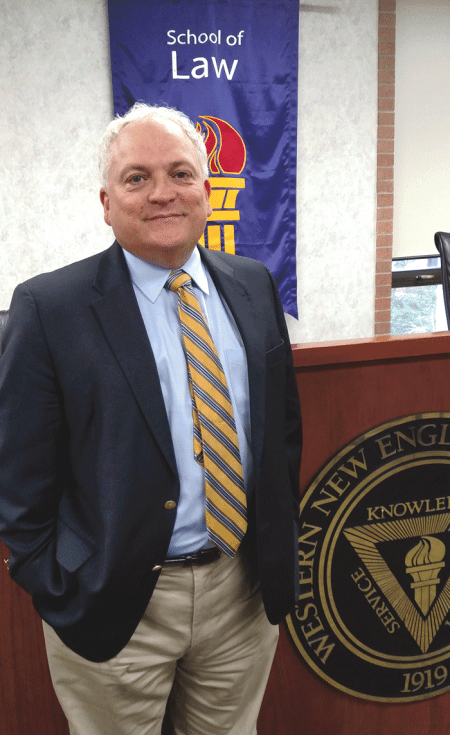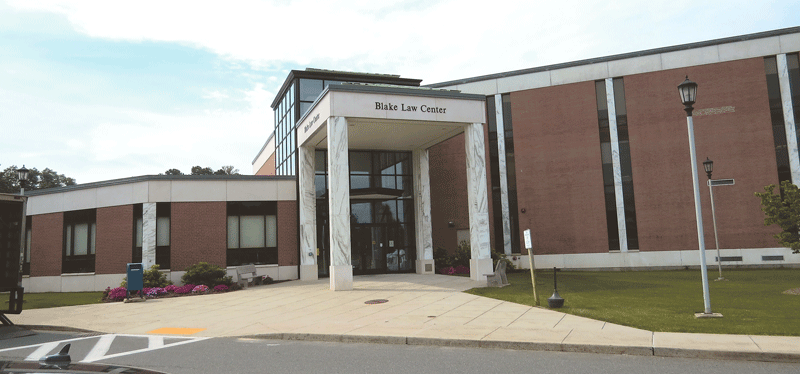Courting Change

Eric Gouvin says law students, like the customers of any business, want return on their investment.
Enrollment was already declining at law schools nationwide when the Great Recession hit, drying up the legal job market and driving the applicant count even lower. That forced a mass contraction at institutions across the U.S., including Western New England University School of Law. But its dean says the strategies undertaken to provide more return on investment for students has brought stability, and the future looks brighter than it has in years.
Few law-school leaders are surprised that enrollment is slightly higher nationally than it was a few years ago — if only because it couldn’t get much lower.
In fact, said Eric Gouvin, dean of Western New England University (WNEU) School of Law, 100,600 individuals applied to law schools during the 2003-04 cycle. In 2014-15, the number was 55,700.
That’s a stark decline, but the numbers are starting to tick up — slowly. Still, no one expects them to soar anytime soon, meaning this has become a new normal across the country — with a few exceptions, like Harvard, which will always have its pick of top applicants.
One reason for the enrollment drop was a declining job market for lawyers, one that began before the Great Recession but accelerated quickly after the 2008 financial crisis. By 2012 or 2013, graduates were finding it very difficult to secure positions right out of school.
To be honest, we were probably making too many lawyers for too long. In the good old days, we just kept saying, ‘we’ll take you; we’ll teach you law,’ but there weren’t necessarily enough jobs for those people. Then, in the Great Recession, people were graduating into an economy that was close to failing. Not only were there no jobs, but existing jobs were being eliminated. Those new graduates were devastated.”
“To be honest, we were probably making too many lawyers for too long,” Gouvin said. “In the good old days, we just kept saying, ‘we’ll take you; we’ll teach you law,’ but there weren’t necessarily enough jobs for those people. Then, in the Great Recession, people were graduating into an economy that was close to failing. Not only were there no jobs, but existing jobs were being eliminated. Those new graduates were devastated.”
That job-market crisis has alleviated significantly, if only because fewer students are seeking a career in the legal field, and law schools — again, with a few, high-profile exceptions — have been forced to contract.
“We can engage in magical thinking, wanting to bring back the good old days, or we can be realistic,” Gouvin told BusinessWest. “The market is saying fewer people want to go to law school. If you’re not Harvard or Georgetown, you have to take that reality into account.”
Just before Gouvin became dean in 2013, the school launched a strategic plan to assess its current situation amid the national enrollment crisis, and where it needed to be given that environment. Part of WNEU’s strategy focused on giving students more return on investment, including a tuition freeze, instituted during the 2013-14 school year and extending through 2017-18.
“A lot of our competitors didn’t do that, so we have essentially cut tuition by not raising it,” he said. “We’re 15% to 20% lower than Quinnipiac, Suffolk, and New England Law, so we’re producing on that end of return on investment.”
The school has been generous with scholarships, too, he said, so its $39,400 annual tuition actually translates to an average of $21,000 per student. “That’s is a pretty darn good deal today.”
With the lowered revenues, of course, WNEU had to keep a close eye on expenses, and it was able to shrink staff through retirements, so that the school, staffed for 550 students when Gouvin arrived, is now staffed for 300 — a notable contraction, he said, but typical of what’s happening across the country.
“With some smart planning on the expense side, we figured out how to offer the same programs with fewer people,” Gouvin said. “As the student body contracted, we needed fewer teachers. One concern some alums might have had was replacing tenured faculty with adjuncts, but that’s not true; since I’ve been here, we’ve had 32 adjuncts a year, all teaching upper-level electives. The core programs are taught by full-time, tenured faculty members.”
The school has also tried hard to avoid unnecessary debt to keep overhead down, he added. “There’s a lot of competition out there to build these incredibly beautiful, palatial buildings, but I don’t have that hanging over my head. I have staff and program expenses, but I don’t have huge debt service.”
Still, keeping tuition down by reducing expenses is only one way to provide that much-discussed ROI that today’s law students crave. The other is to give them more of what they need to secure employment, and on that front, WNEU hasn’t let them down.
Case Studies
For instance, the school has added new programs, some of them to attract students who aren’t necessarily looking to pursue a career practicing law. Such initiatives include a master of laws and letters (LLM) degree in estate planning and elder law, introduced in 2004. More recently, the school added a master’s-degree track in the same discipline.
“We identified that need early on, with the population aging, and a lot of wealth still to be transferred from Baby Boomers to their kids,” Gouvin explained. “We’ve been in a good spot with the elder-law and estate-planning programs we’ve offered, and have expanded them.”
Another focus has been on what Gouvin calls student-centered professional education.
“Student-centeredness is in the water here. I think the students care about each other and have the chance to get to know their professors pretty well. They have an incredible support system, very customer-friendly, problem-solving-oriented,” he explained. “I can’t take credit for that; it was already part of the culture. It’s a real selling point for Western New England.”
But he has led efforts to “up our game” in that area, particularly through the use of clinics — in areas such as criminal defense, criminal prosecution, elder law, and immigration (the latter in cooperation with Community Legal Aid), in which students blend classroom instruction with work on real cases, under the guidance of local attorneys.
The newest clinic centers on family-law mediation. “We’re the only school in the Commonwealth working with the family courts. It’s groundbreaking, and we’re quite proud of it.”
In fact, Gouvin said, about 88% of all students get involved in clinics and externships, understanding the value of developing not only real-world legal knowledge, but the soft skills that will make them more employable.

Eric Gouvin says WNEU School of Law has raised its game by adding new programs and clinics aimed at giving students real-world experience.
In making these community connections, Western New England benefits from its position as the only accredited law school in the Commonwealth west of Greater Boston, Gouvin noted. This uniqueness ensures a broad range of opportunities in the form of internships and clerkships.
“That’s one of our strengths; we have many quality placements with federal judges, state courts, law firms, nonprofits. It’s not like we’re competing with six other law schools to get those spots. And it’s the kind of experience employers find valuable and relevant. For a small school, we nail that.”
I’ve got a police officer, an HR person, a computer tech person, an insurance guy who does construction litigation … none of those want to be practicing lawyers, but they see they can be more effective in their roles by knowing more about the law. A lot of people out there realize law is handy, even if they don’t want to be lawyers.”
WNEU School of Law has also expanded its appeal by launching a master’s degree in law for students who have no intention of becoming lawyers, but who take classes alongside juris doctor students to develop an expertise in legal matters to bring to their chosen career, be it accounting, insurance, banking, journalism, fund-raising, or any number of other disciplines.
“I’ve got a police officer, an HR person, a computer tech person, an insurance guy who does construction litigation … none of those want to be practicing lawyers, but they see they can be more effective in their roles by knowing more about the law,” Gouvin said. “A lot of people out there realize law is handy, even if they don’t want to be lawyers.”
Meanwhile, dual-degree programs like WNEU’s JD/MBA aim for the same type of cross-disciplinary expertise. “It’s never just law; it’s always law and something,” he said. “For students to gain knowledge in their fields and marry that with a law degree, I think that can give them a boost.”
After all, he added, “it’s hard to imagine any aspect of human activity that doesn’t have a legal component to it. We’ve never made less law; we’re always making more.”
Making an Appeal
That simple truth will always provide a stream of young people interested in practicing law, even if that stream has weakened in the new millennium.
“The market four years ago was in shambles, and we’re seeing that it has come back — not to where it was prior to the Great Recession, but it’s probably more sustainable now,” Gouvin told BusinessWest. “The good news is that Western New England and just about every other law school have contracted; instead of pumping 200 graduates a year into a market that can’t absorb them, we’re now graduating 100 into a market that can absorb them.”
Academically, the school must be doing something right, he added, noting that, despite a recent preference for applicants with high GPAs over high LSAT scores, WNEU ranks fifth in the state on percent of students passing the bar, behind only Northeastern, Harvard, Boston University, and Boston College. “That’s with students whose LSATs would have predicted they’d have trouble with the bar.”
Furthermore, Gouvin expects graduates’ job prospects — and, as a result, interest in a law degree — to increase as older lawyers, whose assets were battered by the Great Recession and may have postponed retirement because of it, start seriously considering life after law.
“Many waited until housing and the stock market recovered,” he said, “but now, it may be that more folks see their way clear to retiring.”
At the same time, he was quick to add, the industry is changing, and retiring lawyers won’t be replaced by the same number of newcomers. Technology has reduced some of the workload for attorneys, while paraprofessionals are performing many of the duties lawyers handled a generation ago.
“That being said, there should be a net outflow from the profession,” he went on. “The median age of lawyers has been increasing for the past two decades.”
In other words, the future seems bright for WNEU, which started in 1919 as the Springfield branch of Northeastern, holding classes at the YMCA on Chestnut Street.
“Like I tell alums, we’ve been here 100 years, and we’ll be here another 100 years,” he said, and that’s plenty of time to cultivate new relationships between students and the legal community they one day hope to work in.
He cited a survey UCLA conducts each fall with its incoming freshmen, asking them what they want to do with their lives. Since 2000, the percentage saying they wanted to practice law has been on the decline, from 5.2% in 2000 to a recent low of 3.2%. But in the past two years, the number shot back up. It’s just another data point, Gouvin noted, to encourage those, like him, who are invested in the legal profession.
“Again,” he said, “these are hopefully signs not only that people think going to law school is a good idea, but that going to law school actually is a good idea.”
Joseph Bednar can be reached at bednar@businesswest.com